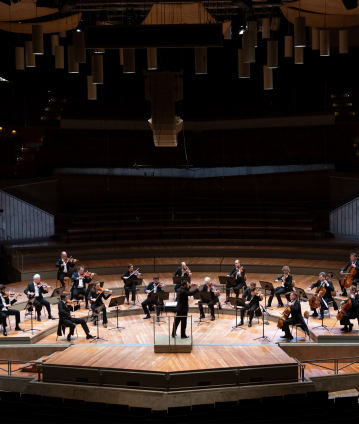The Berlin Phil Series: “Kirill Petrenko Live”

Three weeks after the European Concert, chief conductor Kirill Petrenko appeared again with members of the Berliner Philharmoniker in an otherwise empty Philharmonie. Debussy’s atmospheric, dream-like Prélude à l’après-midi d’un faune was followed by the wild sounds of Hindemith’s Kammermusik No. 1, whose borrowings from popular music were perceived as a provocation by contemporary audiences. The concert ended with the sensuous Verklärte Nacht, an early masterstroke by Arnold Schoenberg. “You can’t play it more beautifully than this” (rbbKulturradio).
For the 2020/21 season, the Berliner Philharmoniker have announced several concerts with music of the fin de siècleand compositions of the 1920s. The latter will be the focus of the very first Bienniale of the Berliner Philharmoniker in February 2021, and a foretaste of both themes was provided by the second concert which chief conductor Kirill Petrenko and members of the orchestra presented in May 2020: Arnold Schoenberg’s Verklärte Nacht and Claude Debussy’s Prélude à l’après-midi d’un faune were written in the 1890s, and Paul Hindemith’s Kammermusik No. 1 was premiered in 1922.
Schoenberg and Debussy rarely spoke about each other, and then mostly rather disparagingly. In truth, however, they were not unaware of the significance of the other: Debussy admired Pierrot Lunaire, while Schoenberg, in turn, placed the works of his colleague, 12 years his senior, on the programmes of his Society for Private Musical Performances, dedicated to contemporary composers. Benno Sachs’s arrangement of the Prélude à l’après-midi d’un faune for chamber orchestra, which Kirill Petrenko chose for this concert, was also created in this context.
What Debussy and Schoenberg had in common was that in their efforts to renew the traditional canon of forms, they were always inspired by literature. The Prélude à l’après-midi d’un faune is based on a poem by Stéphane Mallarmé, whose famous Tuesday evening salons Debussy visited several times. Mallarmé’s symbolist poetry, which attaches as much importance to the sound of words as to their meaning, has been ingeniously transformed into music by the composer. The melody intoned by the flute at the opening, which sounds in ever new harmonisations, can be regarded as the hallmark of French Impressionism.
Arnold Schoenberg was only 24 years old when he wrote his string sextet Verklärte Nacht in 1899, based on Richard Dehmel’s poem of the same name. Schoenberg later arranged two versions for string orchestra. At the time it was written, the composer was inspired stylistically by both Johannes Brahms and Richard Wagner. The strict motivic work and the instrumental formation of Verklärte Nacht allude to Brahms, who himself had written two major string sextets. The harmonies, which are characterised by strong chromaticism, and the reference to a non-musical model are, on the other hand, in the tradition of Wagner and the New German School. The five-part formal arrangement corresponds to Dehmel’s poem, as does the mood, which is marked by a high degree of sensuousness and tension.
Paul Hindemith’s Kammermusik No. 1 is less reminiscent of Schoenberg and Debussy than of Igor Stravinsky. At the premiere during the Donaueschinger Musiktage, the wild finale in particular caused a scandal through the use of light music such as a foxtrot, its rhythms, and the aggressive use of percussion instruments. Kirill Petrenko has identified Hindemith as one of those composers whose works are to be performed more frequently in future concerts of the Philharmoniker. At the Bienniale of the Berliner Philharmoniker, the provocative one-act opera Mörder, Hoffnung der Frauen will be presented under the direction of Donald Runnicles.
© 2020 Berlin Phil Media GmbH
Related interview
Artists
Our recommendations
- Season opening 2020: Kirill Petrenko conducts Schoenberg and Brahms
- 2019 New Year’s Eve Concert with Kirill Petrenko and Diana Damrau
- Kirill Petrenko conducts Zimmermann, Lutosławski and Brahms
- 2025 New Year’s Eve Concert with Kirill Petrenko and Benjamin Bernheim
- Kirill Petrenko conducts Strauss’s “The Woman without a Shadow”
- Season opening 2021: Kirill Petrenko conducts Schubert’s “Great” C major Symphony